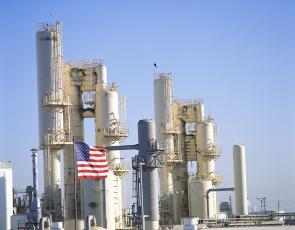America’s freight rail system is an essential part of our national and global supply chains, including those for fuels and petrochemicals. While a work stoppage would be devastating, service curtailments and other strike impacts will be felt much sooner—before a strike is formally launched. As we learned this September, railroads will begin metering traffic and embargoing shipments of materials critical to the refining and petrochemical industries up to a week or more before a strike begins.
Put simply, while December 9th is the day everyone is focused on, the real impacts of a potential strike will be felt much sooner, potentially as early as the beginning of December.
If history repeats itself, we will likely first see metering of “Toxic-by-inhalation” (TIH) materials which are used in many manufacturing processes and in water treatment at municipal facilities, refineries, petrochemical manufacturing sites and other industrial facilities. This will be followed by other materials as the strike inches closer.
Early embargoes will impact refiners’ ability to maintain current high production and utilization rates. The inability to move certain materials in and out of our facilities will eventually overwhelm on-site storage capacity, leading to bottlenecks and eventual forced production cuts.
The Refining & Petrochemical Industries Have High Exposure to a Rail Strike
More than two million carloads of fuel and petrochemical feedstocks and products including crude oil, natural gas liquids, refined products, petrochemicals and plastics move by rail every year.1 Faced with a strike, refiners and petrochemical manufacturers will be challenged with multiple pain points that hinder our ability to move feedstocks, byproducts, components of fuels and refined products.
Feedstocks
While pipelines transport most feedstocks to refiners and petrochemical facilities, rail still plays an important role. 118 million barrels of crude oil moved by rail in 2021, or roughly 322,000 barrels per day and that volume that could supply about two mid-size refineries. For petrochemical facilities, natural gas liquids and refined naphtha are used as feedstocks to manufacture a wide variety of petrochemicals. A disruption in feedstock delivery has the potential to impact production at both refineries and petrochemical facilities.
Fuel Components and Refining Byproducts
Other critical chemicals are delivered to and from our facilities daily by rail. For example, Butanes are used in the refining process to ensure fuels meet consumer specifications. In 2021, over 55 million barrels of butane and isobutane were shipped by rail.2 Disruptions in rail deliveries of these products would quickly hinder fuel production overall.
As mentioned above, chlorine is essential for water treatment. Large quantities of water are used during the treatment and refining of crude oil, and this water must undergo treatment. Without chlorine shipments, a refinery’s ability to operate could be impacted.
A final example involves sulfur and sulfuric acid. During the refining process, sulfur is removed from crude oil to ensure various fuels meet stringent environmental standards. This sulfur is, in turn, moved by rail. If rail transport is not an option and facility storage reaches capacity, refining curtailments will be necessary. Sulfuric acid, also moved by rail, is a key catalyst for oil refiners in the production of alkylate, a critical high-octane blending component needed to produce the cleanest possible gasoline.
These are just a few of the materials that move frequently by rail to and from refineries and petrochemical facilities. The inability to ship or receive these and other materials by rail will impact our members’ operations and U.S. fuel manufacturing at large.
Refined Products
Fuel Ethanol plays an integral role in the production of finished gasoline. Without uninterrupted access to ethanol, sufficient supplies of finished, consumer-ready gasoline could be put in jeopardy. Nearly all gasoline in the United States is 10 percent ethanol (E10). Because of ethanol’s chemical properties that rule out pipeline transportation, almost all (95 percent) of the ethanol required for U.S. gasoline is moved by rail, making ethanol the United States’ second-most rail-trafficked product with over 235 million barrels shipped by rail each year.34
Rail service for the ethanol industry is already known to be problematic and a cause of production cuts at some facilities. A strike would make this tenuous situation even worse.
Because of the ethanol industry’s near-exclusive dependence on rail, any disruption in rail service would have immediate impacts on the ethanol supply chain, potentially forcing production cuts at refineries and leaving fuel terminals unable to blend gasoline with the right specifications for retail sales. If finished gasoline inventories are depleted before regular il service or ethanol production resumes, there could be supply disruptions felt by consumers at the pump.
Petrochemicals
Petrochemicals, like including ethylene and styrene, also are transported by rail and were among the first materials impacted in September prior to a potential strike when railroads began embargoing shipments the early service curtailments announced in February. Ethylene and its co-products and derivatives are fundamental to many segments of the economy, including the production of consumer products, packaging, housing and automotive components and other durable and non-durable goods. Ethylene is used to manufacture polyethylene for food packaging; films and trash bags; polyvinyl chloride (PVC) for pipe, flooring, siding and wall coverings; ethylene glycol for anti-freeze; polyester resins for soft drink bottles; and polystyrene for drink cups. Styrene has a variety of uses and can be relied upon to make meaningful end-products like food packaging, toys and electronics. A rail strike would negatively impact the production of these and other petrochemicals and subsequently the availability of the products made from these materials.
Averting a Strike Should be a Top Priority for Congress
While AFPM hopes the negotiating parties can reach an agreement before any service curtailments are announced, Congress must be ready to step in and use its authority under the Railway Labor Act to legislate a deal, buy more time for negotiations or appoint an arbitrator to finalize a labor agreement. Our country, and its already stressed supply chains, cannot risk the fuel supply disruptions, water treatment backlogs and higher prices across the economy that a catastrophic cessation of freight rail operations would bring.
Once a strike is averted, Congress can return its focus to freight rail service reforms and reauthorization of the Surface Transportation Board (STB) so there is better accountability and oversight of the freight rail system. Our goal, as always, is to promote a healthy, reliable and competitive rail system which we believe is in the best interest of all invested parties and, most importantly, American consumers.
1 See “Freight Rail Facts and Figures”, https://www.aar.org/facts-figures
2 See “EIA: Movements of Crude Oil and Selected Products by Rail”, https://www.eia.gov/dnav/pet/pet_move_railNA_a_EPLLBAI_RAIL_mbbl_a.htm
3 See “EIA: 95% of fuel ethanol moved by rail in H1 2022,” Ethanol Producer Magazine, October 18, 2022, https://ethanolproducer.com/articles/19693/eia-95-of-fuel-ethanol-moved-by-rail-in-h1-2022
4 See “EIA: Movements of Crude Oil and Selected Products by Rail” https://www.eia.gov/dnav/pet/pet_move_railNA_a_EPOOXE_RAIL_mbbl_a.htm


